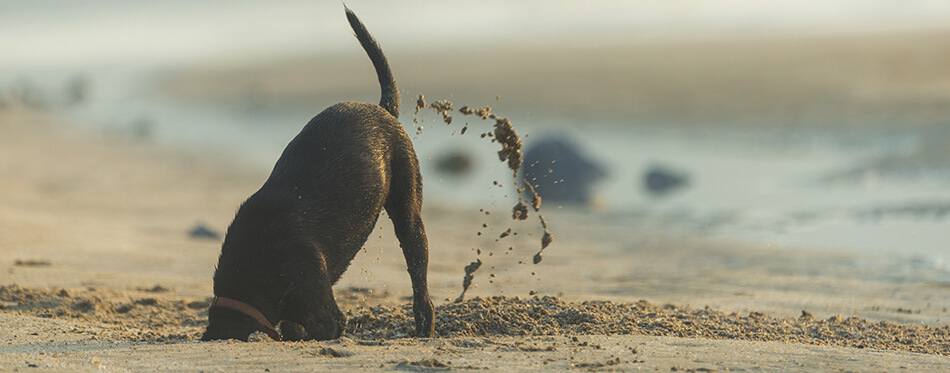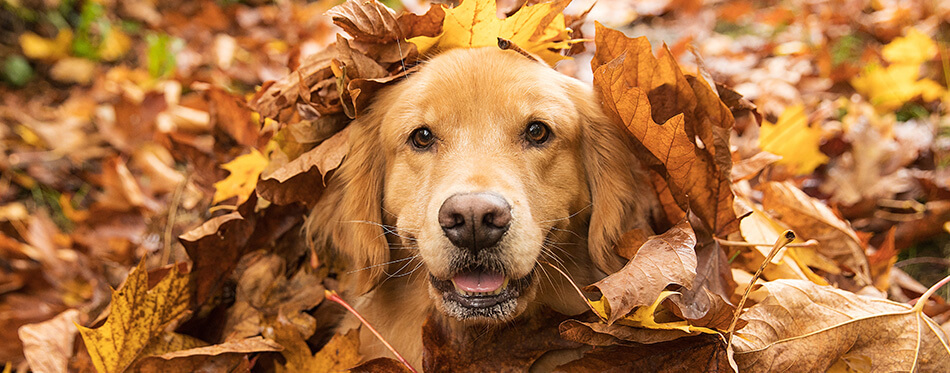Missing a few socks or wondering where the new toy you brought your dog last week has gone? You aren’t the only pet owner facing these questions. Modern dogs have a habit of hiding everything from pet food to their favorite chew toy, and there’s some really interesting dog psychology behind their excellent digging skills.

Why do Domesticated Dogs Bury Things?
No matter what your dog’s breed is, you’ve likely noticed that they enjoy burying bones and hiding things. It’s not just your dog, we promise. Other dogs enjoy the physical stimulation that comes with getting their paws into the ground. They dig deep and create a fresh mound of dirt in your back yard, even if you’ve told them a million times not to.
But why do pups have this heightened desire to always be burying things? Well, the answer lies in their biology as much as it’s a part of their mental state.
Why do Dogs Hide Bones?
Let’s answer a question on every dog owner’s lips: Why do dogs bury bones?
Pet parents don’t need to be concerned about this behavior. It’s as normal as breathing to a dog and is a trait from their wild ancestors. If you find that your garden is being dug up, your dog is doing a little excavating because they’ve forgotten exactly where they hid their goods. Pups find their buried treasures by scent and memory, so digging them back up often turns into a fun game for them.
The bones that your dog brings outside to bury likely have some food left on them. Your dog is burying the bone to preserve that treat for later and to hide it away from other pets in your household.
Why do Dogs Bury Their Toys
Now that you know why dogs specifically bury bones and food, you may be wondering what burying their dog toys has to do with this behavior. Many dogs enjoy burying things they own to keep them safe, and this includes any of their favorite toys from around their home. You may have more toys buried and hidden around your yard than you’re aware of because even your dog may have forgotten where they buried them. They’ll turn up eventually, just like any buried food or treats.
Other Things Dogs Bury
Now that we’ve answered “why do dogs bury their food”, let’s look at a few other things you may be missing from your home:
- TV remote control
- Doggy treats
- Chew toys
- Puzzle toys
- Small, soft items that they may have taken from your laundry basket
These items won’t only be found outside in your yard. Pups will hide them anywhere they feel is a decent enough hiding place – which is why you might find their toys hidden among the couch cushions, or treats folded into the depths of the laundry basket.
There can sometimes be a more concerning reason behind this behavior. Depending on the background that your pets have, they could be burying their food because they’re worried about where their next meal will come from or they’re wrestling with feelings of anxiety. Not all dogs bury things as a form of normal, positive behavior. Stress, anxiety, and boredom can all play a role in the way your dog acts with things that they consider their possessions.
Dogs dig in your garden to find the food and toys that they buried. But they could be digging to try and release pent-up anxiety when in a stressful environment. A dog can become stressed very easily, and that stress is often the result of a change in their surroundings that they aren’t happy about. This could be something as small as the furniture being rearranged or even the introduction of a new pet. Where possible, try to identify the reason your dog is feeling anxious and eliminate the cause.
In cases where the cause is there to stay, be sure to slowly introduce your dog to the thing, person, or new pet that is making them anxious. Try to avoid putting undue stress on your dog in situations where they could be eased into the changes.
Why do Wild Dogs Bury Things?
It’s a dog’s natural instinct to hide away their possessions and food. The ancestors of any of today’s wild or domestic dogs would have buried anything they considered valuable. It was part of their nature to protect these items and keep them safe from rival packs and other animals that might be around the same area.
By burying their valuables, including food that they were keeping during scarce times, wild dogs and wolves were able to ensure their own survival.
This instinct has been passed down to our pets and is an extremely natural behavior. Of course, some pets can be a little destructive with their digging and burning, but the behavior can be tempered and trained; like most innate traits that pups have.
An interesting tidbit about wild dogs is that pack members would help themselves to food caught by one member of the pack if they found it. If any other members of the pack could smell fresh food, they assumed they were welcome to eat, which meant that it was vital for individual dogs to bury their goods to avoid losing their meal altogether.
Dogs Bred to Dig
As well as digging and burying being natural dog behavior, there are some pups that are bred specifically as hunting dogs. These breeds were originally bred to hunt small game alongside humans. Hunting dog breeds include:
- Basset Hounds
- Beagles
- Carin Terriers
- Dachshunds
- Miniature Schnauzers
This is not an exhaustive list, but these are five common hunting dog breeds that are very recognizable. Because these dogs were bred to hunt, they also have several other instincts that tell them to preserve food and other resources. There are several breeds besides these that exhibit similar behavior.
Digging and burying in hunting dogs should not be considered behavioral issues. Though your family members may not enjoy having the yard dug up, they should consider that when a hunting dog was adopted into the family, all of their natural instincts were accepted with the dog.

FAQs:
Q: Do other animals hide things?
A: Like dogs, you can expect any cats in your household to have similar hiding tendencies. Cats share the same instinct to hide their food and possessions, which comes from their own wild cat ancestors. Foxes also store food, as do many animals that hide away during the winter months. Even puppies will quickly show this behavior – it’s nothing to worry about.
Q: How to stop your dog from hiding toys
A: Without a doubt, the best way to train your dog out of this behavior is to use positive reinforcement. This will also work for dogs that are prone to running off with household items that you’d rather they not take from its designated place.
When you see your dog bring a toy or other item out of hiding, call them over and praise them for bringing it back. Play with your dog for a little while, give them a treat, and let them know that they’ve done a good job. Dogs always respond better to positivity, no matter the situation. Disciplining a dog should never result in a stressed or anxious dog.
By telling your dog that they’ve done a good thing and rewarding them, they are more likely to leave that toy out where you can both see it, rather than hiding it away. They will eventually come to realize that their belongings are safe around you and that you won’t take them away.
You can use similar techniques when your dog chooses to bury things and then later recover them. Take notice of your dog when they walk into a room with a toy or treat in their mouth and let them know that you approve of their choice.
You’ll soon see that dogs fulfill the stereotype of burying and hiding things for a reason, and your dog will eventually stop doing this as much once they’re comfortable.
Q: Is burying food normal behavior in dogs?
A: Burying food is somewhat normal behavior, depending on how much food your dog seems to be squirreling away. The time to worry is when it seems that your dog is refusing to eat full meals inside your home. At that point, you should consider seeking veterinary advice, just in case your dog is anxious and has taken to hiding food out of stress.
Q: Does my dog have too many toys?
A: If you’re concerned that your dog has too many toys, consider purchasing a dog toy box for them that you can leave open during the day. Pups of all ages need mental and physical stimulation, so having a range of toys is extremely healthy. That doesn’t mean that you haven’t gone overboard with the toy buying, but this is something that can be remedied by having storage for those toys and getting rid of the ones that your dog just isn’t interested in.

